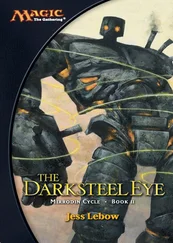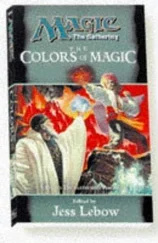Remy came back to bed. April had gotten a little bottle of wine from the minibar, and she drank from it with one hand while she held the remote in the other, running through the channels faster than Remy could register the programs.
“I can’t see anything,” he said. “What are you watching?”
“Electrons,” she said.
So he watched electrons with her, the screen flickering with transient images, and every once in a while he caught one, but they all seemed like pictures from an older America: a woman drove a farm truck; someone ran on a soccer field; a house burned; a couple was married; and then there were the faces, thousands of faces that failed to register anything but the idea of a single shifting face. Aside from the speed, there was something hypnotic and familiar, something intoxicating in this view of life, something that he recalled knowing. But finally the fluttering television was too much like the disorder in his eyes and Remy had to turn away. He reached for the room service menu. “Want to get a real bottle of wine?”
“That,” she said, patting him on the thigh, “is exactly what I want.”
Remy was flipping past the dinner menu toward the wine list when he suddenly turned back. The menu was contained in a three-ring binder, and a separate page had been slipped in, handwritten, and showing that day’s specials.
“We have to leave.” Remy got up and began dressing, the menu open on the bed below him to the dinner special: wasabi marinated duck.
AT NIGHT the homeless in San Francisco operate like cabbies, she explained to him as they hurried down the block. “Trust me, I know this city. If you make eye contact, they’ll offer to give you directions or walk with you to where you’re going. There’s a whole underground city of the homeless and they come up at night to get money for wine and slices of pizza. And there is always one willing to show you to your hotel for a buck or two, or take you to the best club or restaurant. They all know each other and they wave at each other when they pass, and sometimes roll their eyes, just like cabbies with bad fares. I think there’s even a union,” April said, “like the Five-One-Six or something, the international brotherhood of the homeless and indigent.”
She talked as they hustled down the street with only their carry-on bags, Remy occasionally looking back over his shoulder. He saw what looked like a flash of Markham’s Hawaiian shirt a block back, in a crush of people waiting to cross Geary. Remy and April walked two blocks to Sutter, doubled back, and ducked into a dark corner hotel, the lobby bustling with a Japanese tour group waiting to go to dinner.
“We should go with them,” April said. “Pretend we don’t speak English. Take pictures of everything. Buy postcards and snow globes.”
Remy pulled her through the lobby and out a side door, where they were met by a black man in torn jeans and an engineer’s cap. His teeth were gray and placed at random, a handful on top, fewer on bottom.
“You folks need directions?” the man asked. “I know this city better’n you know your wife’s poodum.”
“We’ll need to see your union card,” April laughed.
The man ignored her as Remy fumbled in his pocket for cash. He handed the man a five-dollar bill. “There’s a white guy in a Hawaiian shirt. Brown hair, really young looking. If he comes this way, I need you to stall him. Ask him for money, knock him down, anything.”
They kept moving, zigging up streets and down their crosses as April turned and read the marquees of theaters and the names of stores and bars. Finally, Remy pulled her into a hotel lounge and they sank low into a table in the corner. “We’ll just sit here for a while and then I’ll go check in,” Remy said.
“That sounds nice,” said April sweetly, drunkenly. “We can wear wigs and grow mustaches so no one recognizes us. And I’ll learn to sew. I’ll sew all our food. We’ll live off the grid, in a cabin built from empty wine bottles.” When the waitress came he ordered whiskey for himself and a glass of red wine for April. Remy looked back over his shoulder to the street outside. Faces moved past like the flickering images on the TV.
April rubbed her foot against his leg. “We could take off all our clothes and crawl under the table,” April said. “They’ll never think to look for us there.”
The waitress brought their drinks and Remy drained his whiskey and gestured for another.
April raised her wineglass. “Just for the record, Mr. Remy, I am having the time of my life.”
Remy smiled. “Good.” But then he had a troubling thought. He picked up his menu and leafed through it quickly, running his index finger down the rows of appetizers and entrées. When he saw that it wasn’t there, he sighed, set the menu down and fell back in his chair.
“Relax,” April said. “You’re doing a great job, whatever it is you’re doing.”
“Have you decided?” The waitress was standing over them.
“Yeah. I have,” he said, and with a relief that bordered on joy, Brian Remy ordered the yellow pepper, black bean, and artichoke quesadilla.
THEY MADE love in the new hotel room, too, and when they were done Remy took a long shower. He closed his eyes and let the hot water cascade over his face, pelting his eyelids and his forehead. He opened his mouth and it filled with water and he spat it out, over and over. When he came out April was sleeping and he watched her for a moment, the slow rise and fall of her breasts.
Finally, Remy dropped his towel and climbed into bed, nestling in behind her and staring into the tangle of her dark hair. He kissed the top of her head and she stirred slightly. She looked back over her shoulder at him, smiled, and faced the other way again.
“How was your shower?” she whispered.
“It was good.”
“Good. I like showers. I like to let the water run right over my face like I’m standing in a waterfall.”
They lay there quietly for a while, until her breathing caught up to his and for a moment they were inhaling and exhaling together, and then her breathing began to pull away again, with those cute little puffs of air. It occurred then to Remy that they had no clothes except the ones they’d arrived in, which were now lying on the floor. They’d either have to go back to the airport to get their luggage or go shopping.
“Listen, tomorrow-” Remy began.
“Shh,” she said. “No tomorrow.”
HE WOKE at ten to the sound of a light knocking at the door. April was still asleep. He looked up. The walls in the room were off-white, and the room had a light oak armoire that contained the television, refrigerator, and stereo. The door was still deadbolted shut. “Yes?” he said.
“Housekeeping,” said a voice on the other side.
“Can you come back?” Remy said.
“Chure. I comb back.”
Remy sat up and looked around the room. It was smaller than the other hotel room, nothing in this room but a bed and a small desk with a business phone. He called downstairs for coffee, fruit, and bagels.
“We could stay here forever,” she said from the bed.
“You think so?” Remy asked.
“Just run from hotel to hotel, screwing and pretending someone’s after us.”
Remy didn’t say anything.
“We’ll change our names every day. Today… I’ll be Monique. Who are you?”
“What?”
“Who are you going to be?”
“Uh… Steve,” Remy said.
“Steve and Monique. Good. Okay, who are we? What do we do?”
“I don’t know,” Remy said.
“Monique is a jewel thief. She’s fifty-two. A former actress and figure skater from the old Soviet Union who defected as a teenager, but after the Cold War ended she missed the old intrigue, so she works for an international cartel stealing jewels from wealthy industrialists and other assholes who capitalize on poor workers.”
Читать дальше












